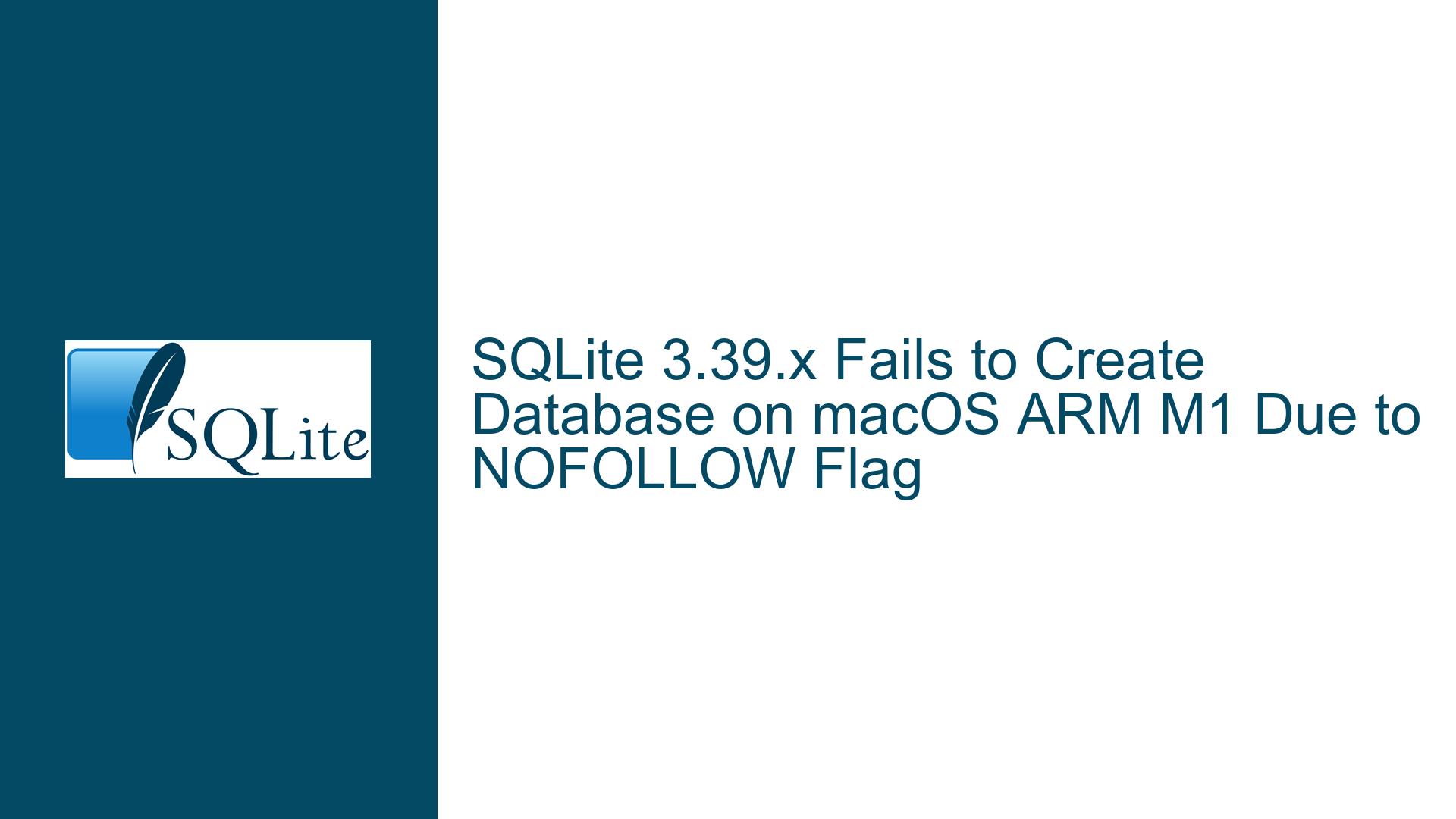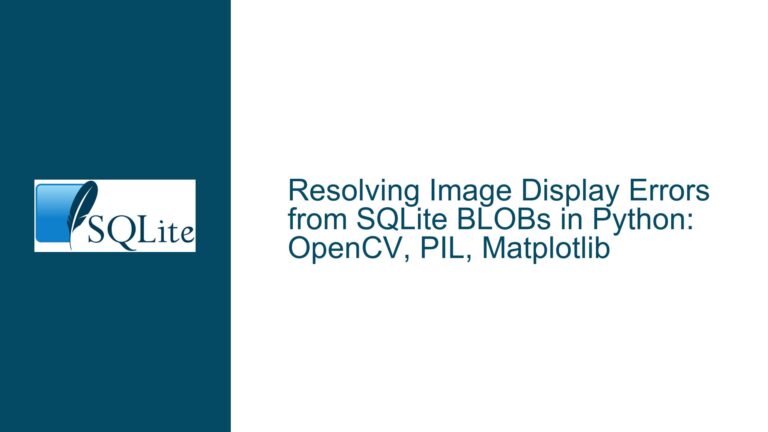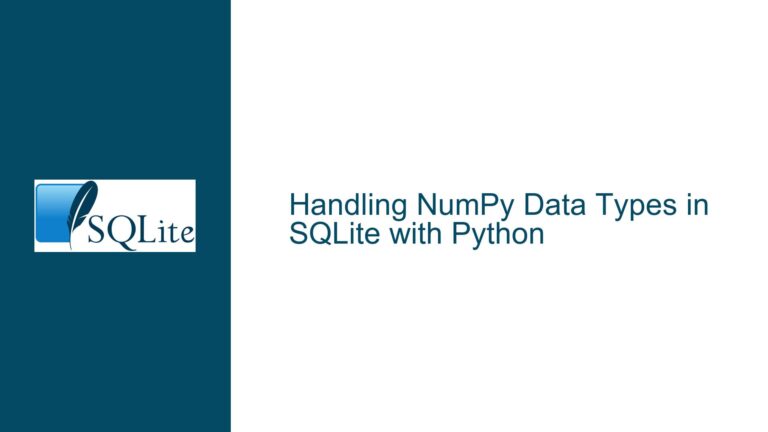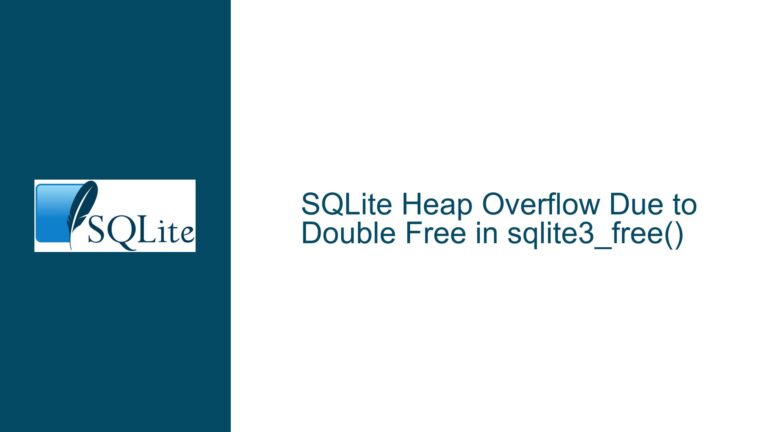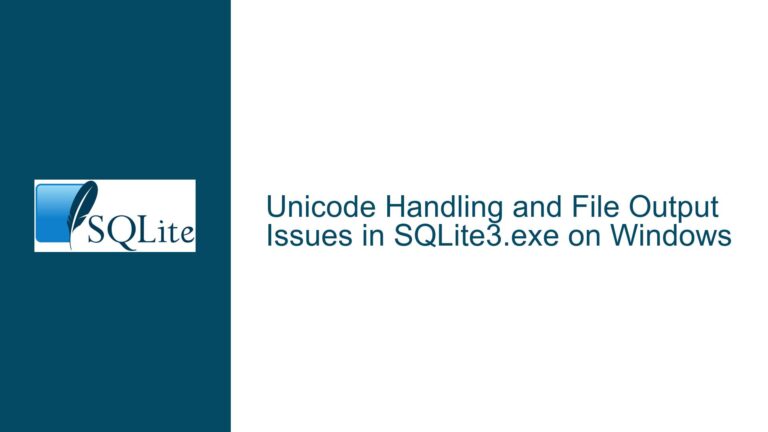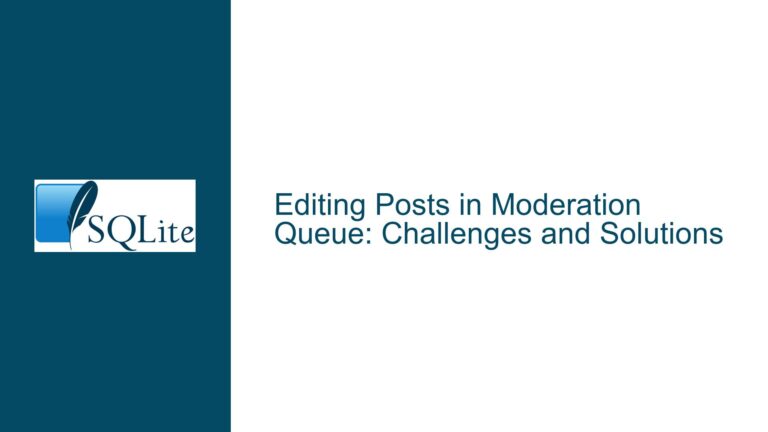SQLite 3.39.x Fails to Create Database on macOS ARM M1 Due to NOFOLLOW Flag
Issue Overview: SQLite 3.39.x Fails to Create Database on macOS ARM M1 with SQLITE_OPEN_NOFOLLOW Flag
The core issue revolves around the inability to create or open a SQLite database on macOS ARM M1 architecture when using SQLite version 3.39.x with the SQLITE_OPEN_NOFOLLOW flag enabled. This problem manifests specifically in environments where the database file path includes symbolic links, such as the /tmp directory on macOS, which is a common symlink to /private/tmp. The issue does not occur in SQLite 3.38.x or earlier versions, nor does it occur on other operating systems like Ubuntu, even with the same flag enabled.
The problem was first identified in a Rust application using the rusqlite crate, where the database creation process failed after upgrading to SQLite 3.39.x. The Rust code worked flawlessly with SQLite 3.38.x but began failing with the error unable to open database file when the SQLITE_OPEN_NOFOLLOW flag was used in conjunction with the SQLITE_OPEN_CREATE flag. A minimal C reproducer was later provided, confirming that the issue is not specific to Rust or the rusqlite wrapper but is instead a behavior change in SQLite 3.39.x itself.
The root cause of the issue lies in a change introduced in SQLite 3.39.0, where the Unix OS interface was modified to resolve all symbolic links in database filenames before opening the file. This change was made at the request of Apple’s security team to enhance security by preventing symlink-related vulnerabilities. However, this change inadvertently caused the SQLITE_OPEN_NOFOLLOW flag to behave more strictly than intended, leading to the observed failure on macOS.
Possible Causes: Symbolic Link Resolution and NOFOLLOW Flag Interaction
The failure to create or open a database on macOS ARM M1 with SQLite 3.39.x can be attributed to the interaction between the SQLITE_OPEN_NOFOLLOW flag and the new symbolic link resolution behavior introduced in SQLite 3.39.0. Below are the key factors contributing to this issue:
Symbolic Link Resolution in SQLite 3.39.x:
In SQLite 3.39.0, the Unix OS interface was updated to resolve all symbolic links in the database file path before opening the file. This change was made to address security concerns raised by Apple, as symlinks can be exploited to redirect file operations to unintended locations. While this change improves security, it also affects how theSQLITE_OPEN_NOFOLLOWflag behaves.Strict Enforcement of NOFOLLOW Flag:
TheSQLITE_OPEN_NOFOLLOWflag is designed to prevent SQLite from opening a database file if any component of the file path is a symbolic link. In SQLite 3.39.x, the combination of symbolic link resolution and theNOFOLLOWflag results in a stricter enforcement of this rule. Specifically, if any part of the file path (including directories like/tmp) is a symlink, the operation fails, even if the final component of the path is not a symlink.macOS-Specific Behavior:
On macOS, the/tmpdirectory is a symbolic link to/private/tmp. This is a standard configuration on macOS, but it becomes problematic when using SQLite 3.39.x with theNOFOLLOWflag. The new symbolic link resolution behavior causes SQLite to treat the/tmpdirectory as a symlink, triggering theNOFOLLOWrestriction and preventing the database from being opened or created.Inconsistent Behavior Across Platforms:
The issue is specific to macOS due to its use of symlinks in common directories like/tmp. On other operating systems, such as Ubuntu, the same code works without issues because the file paths do not typically include symlinks in the same way. This inconsistency highlights the platform-specific nature of the problem.Misinterpretation of NOFOLLOW Documentation:
The documentation for theSQLITE_OPEN_NOFOLLOWflag states that the database filename is not allowed to "be" a symbolic link. However, the current implementation in SQLite 3.39.x interprets this to mean that no part of the file path can be a symlink. This interpretation is stricter than what some users expect, leading to confusion and unexpected failures.
Troubleshooting Steps, Solutions & Fixes: Addressing the NOFOLLOW Flag Issue on macOS ARM M1
To resolve the issue of SQLite 3.39.x failing to create or open a database on macOS ARM M1 with the SQLITE_OPEN_NOFOLLOW flag, consider the following steps and solutions:
Disable the NOFOLLOW Flag:
The simplest and most immediate solution is to remove theSQLITE_OPEN_NOFOLLOWflag from the database opening flags. This flag is not strictly necessary for most applications, and disabling it allows SQLite to function as expected on macOS. For example, modify the Rust code as follows:let db_open_flags = OpenFlags::SQLITE_OPEN_READ_WRITE | OpenFlags::SQLITE_OPEN_FULL_MUTEX;Similarly, in the C reproducer, remove the
SQLITE_OPEN_NOFOLLOWflag:int open_result = sqlite3_open_v2( DB_NAME, &db, SQLITE_OPEN_READWRITE | SQLITE_OPEN_FULLMUTEX | SQLITE_OPEN_CREATE, NULL );Use an Alternative Directory:
If theNOFOLLOWflag is required for security reasons, consider using a directory that does not contain symbolic links. For example, instead of/tmp, use a directory like~/Documentsor a custom path that is not a symlink. This avoids triggering theNOFOLLOWrestriction while maintaining security.Patch SQLite Source Code:
For advanced users, it is possible to modify the SQLite source code to adjust the behavior of theNOFOLLOWflag. Specifically, theunixOpenfunction in the Unix OS interface can be updated to only check the final component of the file path for symlinks, rather than the entire path. This change aligns with the documented behavior of theNOFOLLOWflag and resolves the issue on macOS. However, this approach requires recompiling SQLite from source and may not be suitable for all users.Revert to SQLite 3.38.x:
If the above solutions are not feasible, consider reverting to SQLite 3.38.x or an earlier version that does not include the symbolic link resolution change. This is a temporary workaround and should only be used if other solutions cannot be implemented. Note that this approach may leave the application vulnerable to symlink-related security issues.Engage with the SQLite Development Team:
If the issue significantly impacts your application, consider engaging with the SQLite development team to request a clarification or adjustment to theNOFOLLOWflag behavior. Provide detailed information about your use case and the specific challenges you are facing on macOS. The SQLite team is generally responsive to well-documented issues and may consider changes in future releases.Update Documentation and Raise Awareness:
To prevent confusion among other users, consider contributing to the SQLite documentation by clarifying the behavior of theNOFOLLOWflag. Specifically, highlight that the flag applies to the entire file path, not just the final component. This clarification can help users make informed decisions when using the flag.Monitor Future SQLite Releases:
Keep an eye on future SQLite releases for updates related to theNOFOLLOWflag and symbolic link resolution. The SQLite development team may address this issue in a future release, either by adjusting the behavior of the flag or by providing additional configuration options.
By following these steps, you can effectively address the issue of SQLite 3.39.x failing to create or open a database on macOS ARM M1 with the SQLITE_OPEN_NOFOLLOW flag. Each solution has its trade-offs, so choose the one that best aligns with your application’s requirements and constraints.
